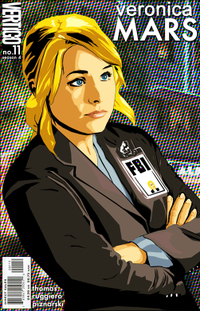Today WGA members received an email from Patric Verrone, our Guild president, regarding the small number of writers who decided to go "financial core" during the strike. I have a great deal of respect for Patric, and I wholeheartedly supported the strike, but I found the wording, intent, and underlying message of the email offensive, particularly this:
[…]there were a puny few who chose to do otherwise, who consciously and selfishly decided to place their own narrow interests
over the greater good. Extreme exceptions to the rule, perhaps, but this handful of members who went financial core, resigning from the union yet continuing to receive the benefits of a union contract, must be
held at arm’s length by the rest of us and judged accountable for what they are – strikebreakers whose actions placed everything for which we fought so hard at risk.
He went on to include a link to a list of those writers, who number less than two dozen.
Patric’s letter, and his rallying cry to scorn those writers, harkens back to one of the darkest chapters in entertainment history for writers — the blacklist. In my view, Patric is asking us to engage in that same, despicable behavior… to exclude these writers from work opportunities because of their political views. While I strongly disagree with what those writers did, I resent the Guild asking me to blacklist them because of it.
The writers who went financial core objected to the strike but at least they followed the rules to express their dissatisfaction. I can respect their courage and integrity if not their views. They didn’t hide in the shadows, saying one thing ("I support the strike!") and doing another (writing scab scripts for a daily soap). They stood up and were willing to be held accountable for their actions.
I would, at least to some degree, understand Patric’s suggestion if he was talking about the people who actually scabbed…who toiled in secret, writing scripts for shows while the rest of us were walking the picket lines and losing our incomes. Go after the scabs, expose them, fine them, throw them out of the Guild. I am all for that.
But tarring-and-feathering the writers who went financial core, and suggesting that we not hire them, is wrong. The boards of the WGA West and East should be ashamed of endorsing this wrong-headed action and supporting this offensive letter.
UPDATE: The complete text of Patric Verrone’s letter, and a spirited debate about it, can be found at Nikki Finke’s Deadline Hollywood Daily.
UPDATE: WGA members Craig Mazin and John August share their opinions about the letter.
UPDATE 4/22/08: Nikki Finke reports that the AMPTP has filed an unfair labor practices charge with the NLRB over the WGA’s letter. The AMPTP statement reads, in part:
By publicly naming names and encouraging people who have the power to
hire writers to keep them "at arm’s length," and saying they must be
"judged accountable" it is clear the WGA leadership is seeking to deny
employment to these writers in the future. That is a direct violation
of federal labor law, and as the employers of those writers we have a
responsibility to defend them and the rule of law in this case.
I don’t condone the AMPTP’s motives for filing the charges, but their statement is absolutely right and I hope the NLRB slaps the WGA with stiff sanctions for this. For the first time since I joined the WGA, I am ashamed of my Guild and its leadership. The WGA Board needs to apologize for what they have done.
UPDATE 4/26/08: I have now heard from three board members, two of whom said that they were blindsided by the letter. They told me that the Board had voted to release the names of the fi-core writers, but they had no idea that the membership would be told not to associate with them. I am hoping that there will be a clarification and/or apology to the membership following the next board meeting.





